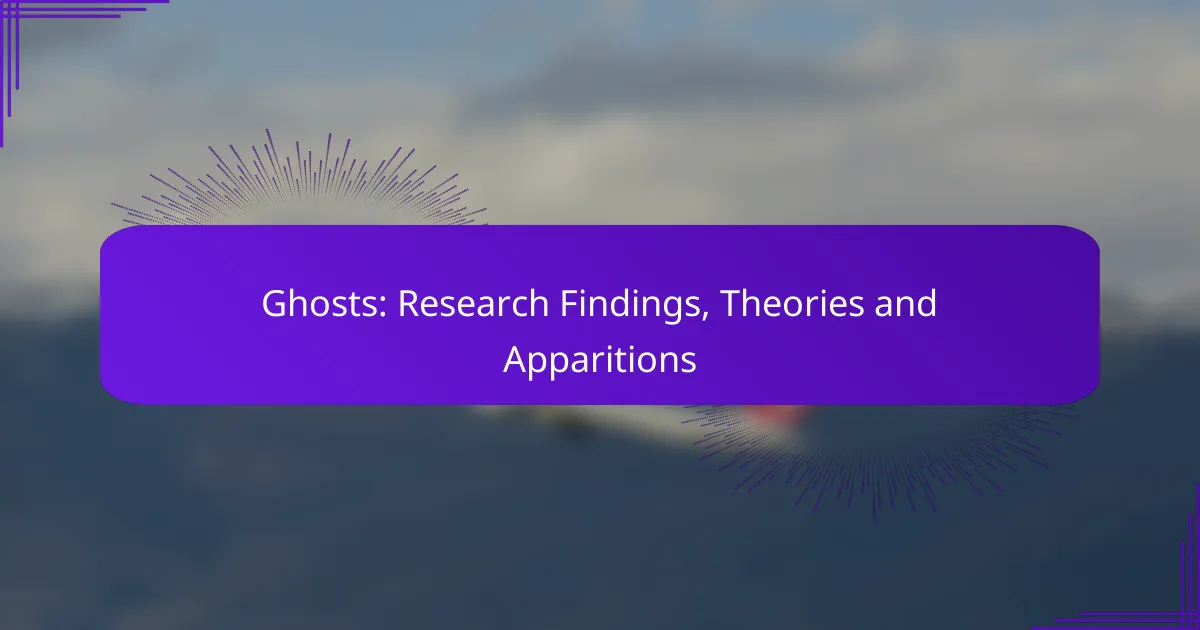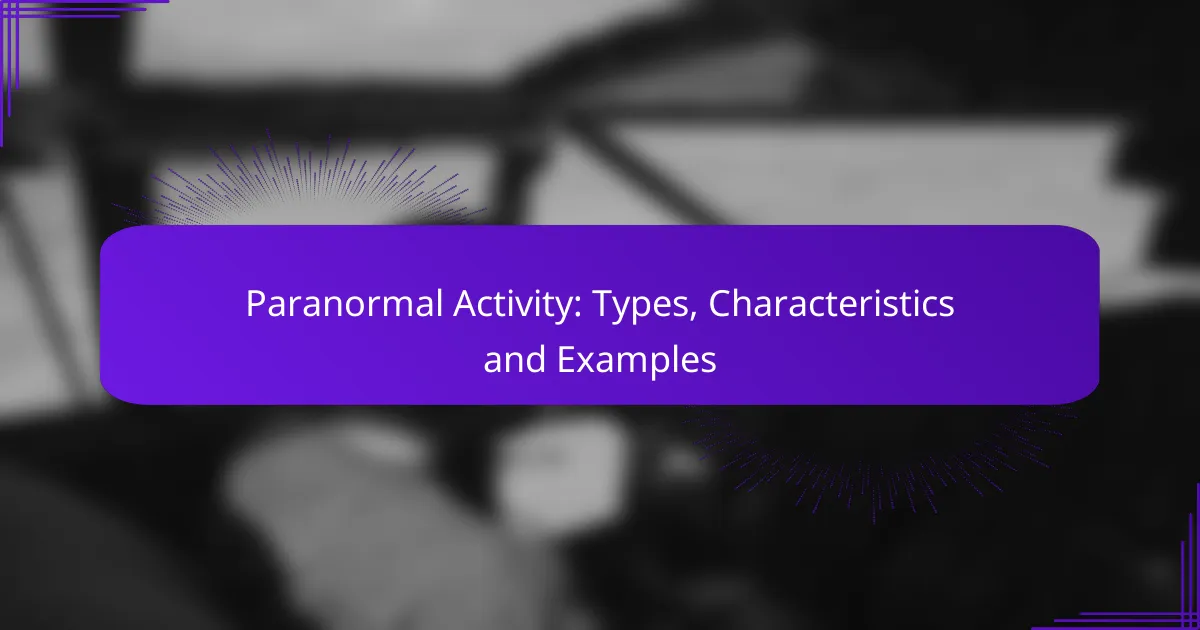Sleep paralysis is a phenomenon characterized by temporary inability to move or speak while falling asleep or waking up, often accompanied by vivid hallucinations. Many individuals report experiencing sensations that blur the line between reality and the supernatural, leading to a belief in connections with paranormal events. Understanding these experiences can provide valuable insights into both the psychological and cultural interpretations of sleep disturbances.
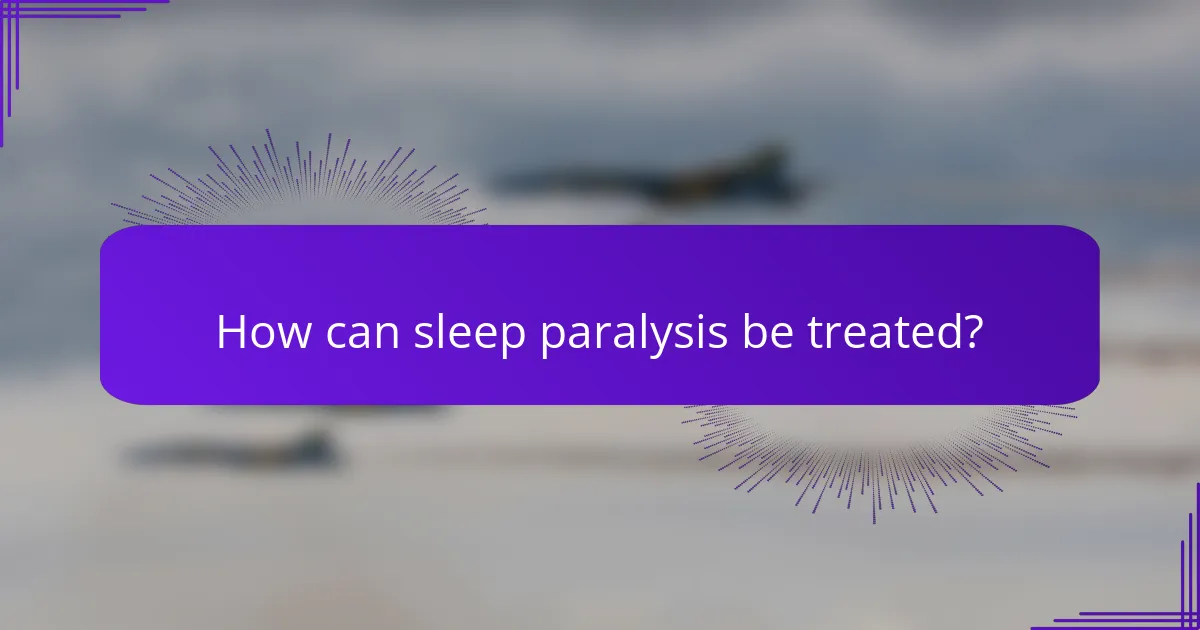
How can sleep paralysis be treated?
Treating sleep paralysis involves a combination of behavioral strategies, medication, and lifestyle adjustments. Effective approaches can help reduce the frequency and intensity of episodes, allowing individuals to regain control over their sleep experiences.
Cognitive Behavioral Therapy
Cognitive Behavioral Therapy (CBT) is a structured approach that helps individuals identify and change negative thought patterns related to sleep paralysis. By addressing fears and anxieties, CBT can reduce the occurrence of episodes and improve overall sleep quality.
Working with a trained therapist, individuals can learn coping strategies and relaxation techniques that specifically target the stressors contributing to sleep paralysis. This therapy often requires several sessions to achieve lasting results.
Medication options
In some cases, medication may be prescribed to help manage sleep paralysis. Antidepressants, particularly selective serotonin reuptake inhibitors (SSRIs), can help regulate sleep patterns and reduce episodes.
Consulting with a healthcare provider is essential to determine the right medication and dosage, as individual responses can vary significantly. Regular follow-ups can help monitor effectiveness and adjust treatment as needed.
Sleep hygiene practices
Maintaining good sleep hygiene is crucial in preventing sleep paralysis. This includes establishing a consistent sleep schedule, creating a comfortable sleep environment, and avoiding stimulants like caffeine close to bedtime.
Practices such as limiting screen time before sleep and engaging in relaxing activities can enhance sleep quality. Aim for 7-9 hours of sleep per night to support overall health and reduce the likelihood of sleep disturbances.
Stress management techniques
Effective stress management can significantly decrease the frequency of sleep paralysis episodes. Techniques such as mindfulness, meditation, and deep-breathing exercises can help calm the mind and body before sleep.
Incorporating regular physical activity and engaging in hobbies can also alleviate stress. Finding what works best for you may require some experimentation, but consistency is key to long-term benefits.
Sleep position adjustments
Changing sleep positions may help reduce the risk of sleep paralysis. Many individuals report that sleeping on their back increases the likelihood of episodes, while side sleeping often decreases it.
Experimenting with different positions can be beneficial. Using pillows for support or trying a body pillow may help maintain a comfortable side-sleeping position throughout the night.
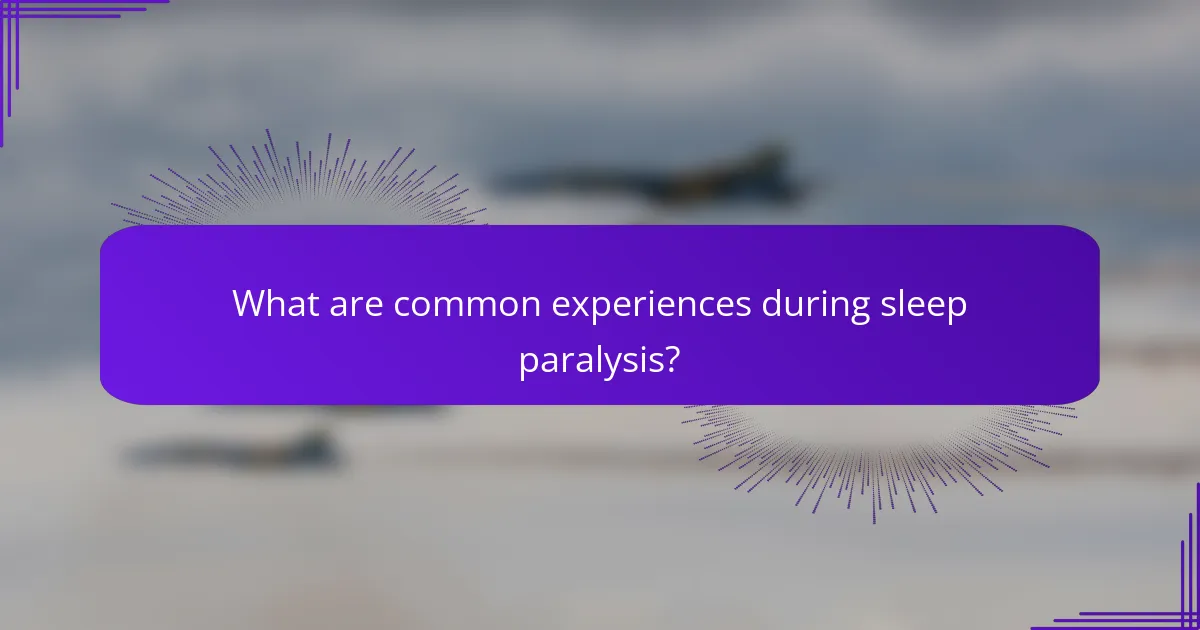
What are common experiences during sleep paralysis?
Common experiences during sleep paralysis include a range of vivid sensations and perceptions that occur while falling asleep or waking up. Individuals often report feeling unable to move, accompanied by visual and auditory hallucinations, as well as various physical sensations.
Visual hallucinations
During sleep paralysis, many people experience visual hallucinations that can be frightening or unsettling. These may include seeing shadowy figures, distorted shapes, or even full-blown apparitions in the room. Such experiences can feel incredibly real, often leading to a heightened sense of fear.
These hallucinations typically occur in low-light conditions and can be influenced by the individual’s cultural background or personal beliefs. For example, some may see figures resembling folklore creatures, while others might perceive more abstract forms.
Auditory hallucinations
Auditory hallucinations during sleep paralysis can range from hearing whispers to loud, menacing sounds. Some individuals report hearing their name being called or experiencing a sense of pressure from unseen forces. These sounds can amplify the feeling of dread and helplessness associated with the experience.
Like visual hallucinations, auditory experiences can be shaped by cultural context. In some cultures, people may interpret these sounds as spiritual messages or warnings, while in others, they may be viewed as purely psychological phenomena.
Physical sensations
Physical sensations during sleep paralysis often include feelings of pressure on the chest, a sense of choking, or an inability to breathe. These sensations can be distressing and may lead to panic, as individuals feel trapped in their own bodies. Some report a tingling or vibrating feeling, which can add to the overall confusion and fear.
Understanding that these physical experiences are a result of the body’s sleep mechanisms can help alleviate some anxiety. Techniques such as focused breathing or grounding exercises may assist in managing the fear when these sensations occur.
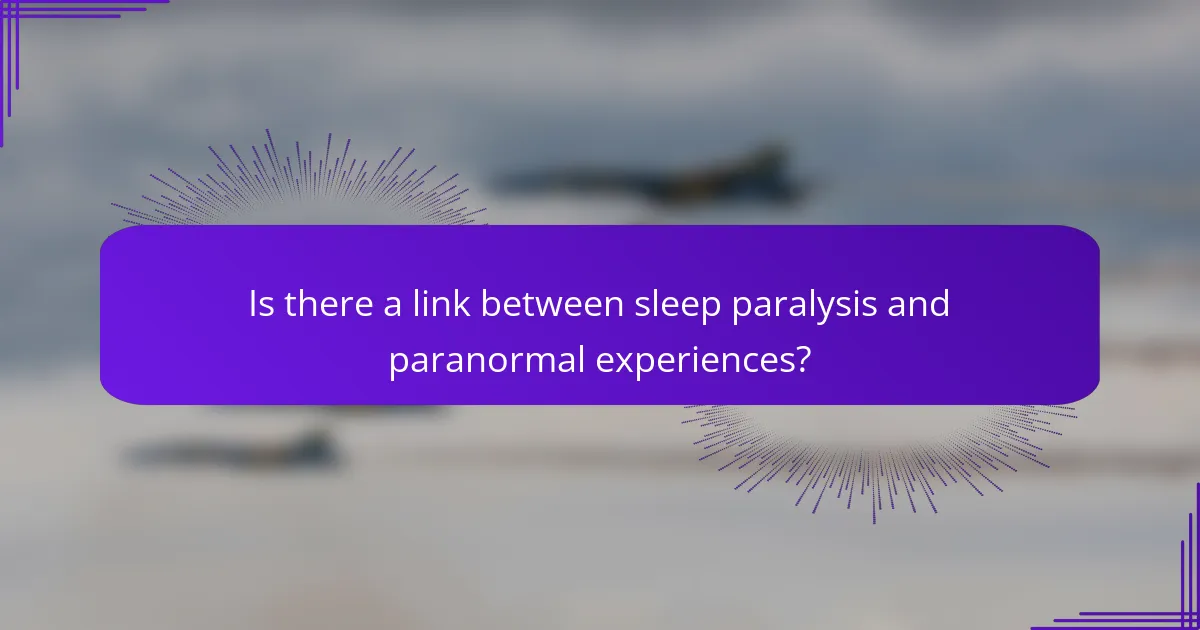
Is there a link between sleep paralysis and paranormal experiences?
Yes, many individuals report a connection between sleep paralysis and paranormal experiences. During episodes of sleep paralysis, people often experience hallucinations that can be interpreted as supernatural encounters, leading to a belief in a link between the two phenomena.
Historical interpretations
Throughout history, sleep paralysis has been interpreted in various ways, often influenced by cultural beliefs. In medieval Europe, it was commonly thought to be the work of malevolent spirits or witches, with victims describing sensations of being attacked or suffocated by an unseen force.
Similarly, ancient cultures attributed sleep paralysis to supernatural beings. For instance, in some African and Asian traditions, it was believed that a spirit was sitting on the chest of the sleeper, causing the inability to move or speak.
Modern anecdotal evidence
In contemporary society, many individuals continue to report experiences during sleep paralysis that they interpret as paranormal. Common accounts include seeing shadowy figures, feeling a presence in the room, or hearing strange noises, which can lead to a belief in ghosts or other entities.
These anecdotal experiences often lack scientific validation but are compelling enough to influence personal beliefs about the supernatural. The emotional impact of these episodes can also reinforce the perception of a paranormal connection.
Cross-cultural beliefs
Different cultures have unique interpretations of sleep paralysis, often reflecting their beliefs about the supernatural. For example, in some Hispanic cultures, it is referred to as “la Llorona,” where it is believed that a ghostly figure causes the paralysis.
In contrast, cultures in the Middle East may view sleep paralysis as an encounter with djinn, supernatural beings that can influence human behavior. These cross-cultural beliefs highlight how sleep paralysis is often framed within the context of local folklore and spiritual understanding.
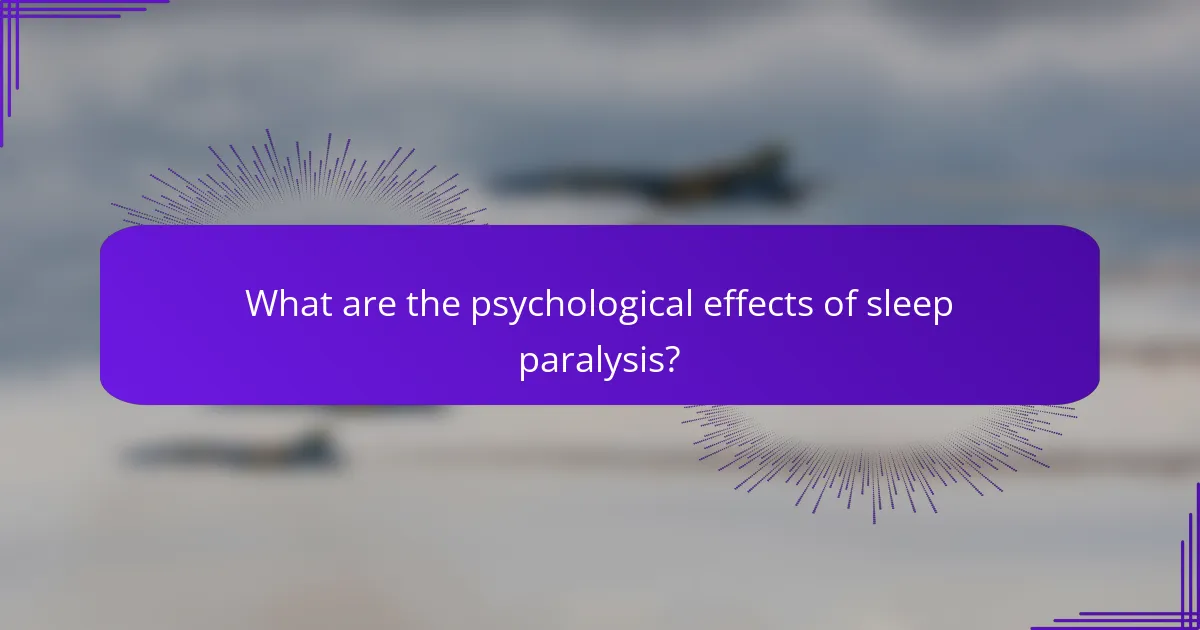
What are the psychological effects of sleep paralysis?
Sleep paralysis can lead to various psychological effects, including heightened anxiety and stress. Individuals often experience vivid hallucinations and a sense of helplessness, which can contribute to long-term mental health issues.
Impact on mental health
The psychological impact of sleep paralysis can be significant, with many individuals reporting symptoms of anxiety and depression. These experiences can lead to a fear of sleep, creating a cycle where the anticipation of paralysis exacerbates mental health issues.
In some cases, persistent sleep paralysis may contribute to conditions like post-traumatic stress disorder (PTSD), especially if the episodes are particularly frightening. Seeking professional help can be crucial for those affected.
Fear and anxiety levels
Fear and anxiety levels often increase in individuals who experience sleep paralysis. The inability to move during an episode can create a sense of panic, leading to heightened anxiety about future occurrences.
Many people report that the fear of sleep paralysis affects their ability to fall asleep, resulting in a vicious cycle of sleep deprivation and increased anxiety. Techniques such as relaxation exercises and cognitive behavioral therapy can help manage these feelings.
Sleep quality deterioration
Sleep paralysis can significantly deteriorate overall sleep quality, as individuals may develop insomnia or disrupted sleep patterns due to fear of episodes. This can lead to chronic fatigue and decreased daytime functioning.
To improve sleep quality, establishing a consistent sleep schedule and creating a calming bedtime routine can be beneficial. Avoiding stimulants before bed and ensuring a comfortable sleep environment may also help reduce the frequency of sleep paralysis episodes.
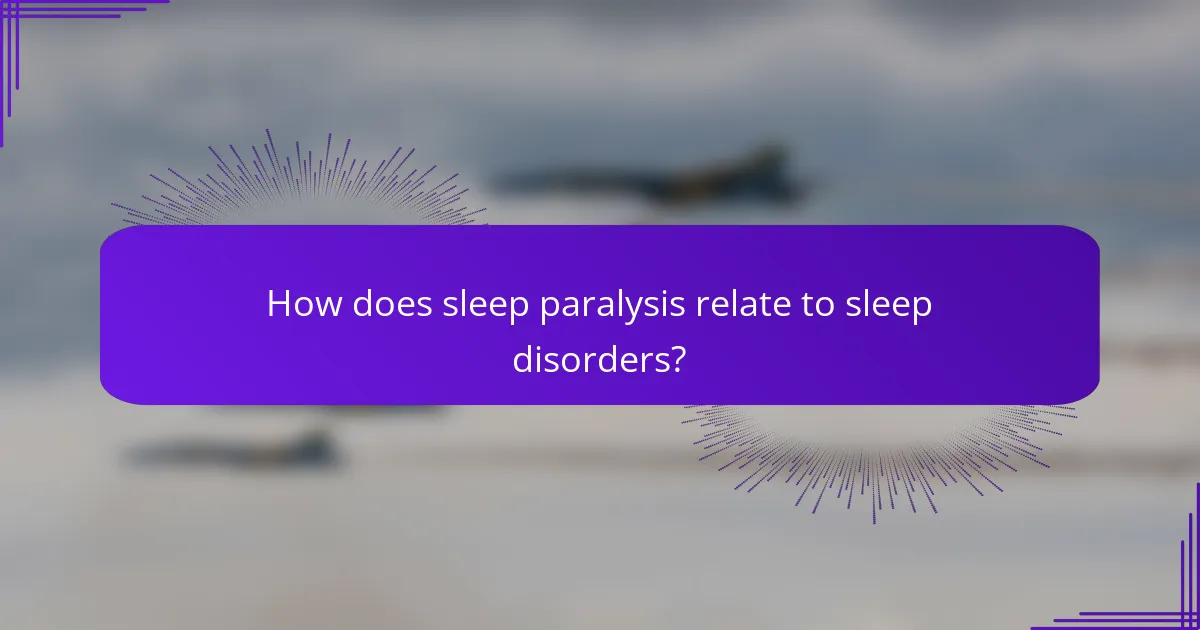
How does sleep paralysis relate to sleep disorders?
Sleep paralysis is closely linked to various sleep disorders, particularly those that disrupt normal sleep patterns. It often occurs during transitions between wakefulness and sleep, making it a common experience for individuals with conditions like narcolepsy and insomnia.
Connection to narcolepsy
Narcolepsy is a neurological disorder that affects the brain’s ability to regulate sleep-wake cycles, leading to excessive daytime sleepiness and sudden sleep attacks. Individuals with narcolepsy frequently experience sleep paralysis, particularly during the transition to or from REM sleep, where the body is temporarily immobilized.
Approximately 60-70% of narcolepsy patients report experiencing sleep paralysis at some point. This phenomenon can be accompanied by vivid hallucinations, which may contribute to the perception of paranormal experiences.
Association with insomnia
Insomnia, characterized by difficulty falling or staying asleep, can also increase the likelihood of sleep paralysis. Poor sleep quality and irregular sleep patterns associated with insomnia can disrupt the natural sleep cycle, leading to more frequent episodes of paralysis.
Individuals suffering from insomnia may experience heightened stress and anxiety, which can further exacerbate sleep disturbances. Managing insomnia through proper sleep hygiene and relaxation techniques may help reduce the occurrence of sleep paralysis episodes.

